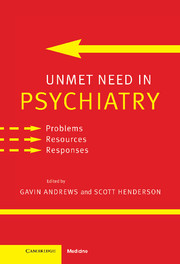Book contents
- Frontmatter
- Contents
- List of Contributors
- Preface
- Part I Unmet need: defining the problem
- Part II Unmet need: general problems and solutions
- Part III Unmet need: people with specific disorders
- Part IV Unmet need: specific issues
- Introduction
- 22 Unmet need in mental health service delivery: children and adolescents
- 23 Assessing psychopathology among children aged four to eight
- 24 Unmet need in Indigenous mental health: where to start?
- 25 Health systems research: a pragmatic model for meeting mental health needs in low-income countries
- 26 Disablement associated with chronic psychosis as seen by two groups of key informants: patients and mental health professionals
- 27 The assessment of perceived need
- 28 Public knowledge of and attitudes to mental disorders: a limiting factor in the optimal use of treatment services
- Part V Unmet need: conclusion
- Index
28 - Public knowledge of and attitudes to mental disorders: a limiting factor in the optimal use of treatment services
from Part IV - Unmet need: specific issues
Published online by Cambridge University Press: 21 August 2009
- Frontmatter
- Contents
- List of Contributors
- Preface
- Part I Unmet need: defining the problem
- Part II Unmet need: general problems and solutions
- Part III Unmet need: people with specific disorders
- Part IV Unmet need: specific issues
- Introduction
- 22 Unmet need in mental health service delivery: children and adolescents
- 23 Assessing psychopathology among children aged four to eight
- 24 Unmet need in Indigenous mental health: where to start?
- 25 Health systems research: a pragmatic model for meeting mental health needs in low-income countries
- 26 Disablement associated with chronic psychosis as seen by two groups of key informants: patients and mental health professionals
- 27 The assessment of perceived need
- 28 Public knowledge of and attitudes to mental disorders: a limiting factor in the optimal use of treatment services
- Part V Unmet need: conclusion
- Index
Summary
The distribution of treatment services in the population is determined not only by the planning of health administrators and service providers, but also by the wishes of the public for particular kinds of services. Unfortunately, the public's beliefs about mental disorders and their treatment do not always correspond with those of service providers. This chapter reviews national surveys of public knowledge and attitudes towards mental disorders carried out in Australia, Germany, and Austria. Putting the results of these surveys together, it can be concluded that while the public believe that mental disorders can be treated, their views on the effectiveness of various treatments differ greatly from those of mental health professionals. The public are very negative about pharmacological treatments, but more positive about psychotherapy and alternative treatments. Many believe that psychotherapy is effective for psychotic and organic mental disorders. There is also a widespread stigma against those who suffer from a mental disorder. These beliefs may affect the sorts of help the public seek for mental disorders and may adversely affect adherence to some types of interventions. Any attempt at top-down planning of the distribution of mental health services will run into difficulties if it conflicts with the public's beliefs about treatment. A more feasible approach may be to encourage a diversity of effective interventions which consumers can choose from, according to their beliefs about treatment.
A major assumption of this book is that treatment services could be more rationally distributed in the population if we took account of data on prevalence, disablement, treatment effectiveness, and the direct and indirect costs of mental disorders.
Keywords
- Type
- Chapter
- Information
- Unmet Need in PsychiatryProblems, Resources, Responses, pp. 399 - 414Publisher: Cambridge University PressPrint publication year: 2000
- 60
- Cited by



